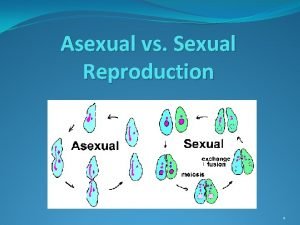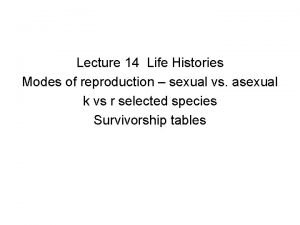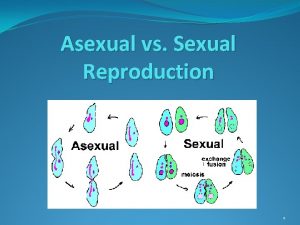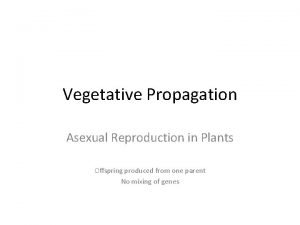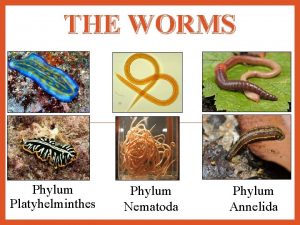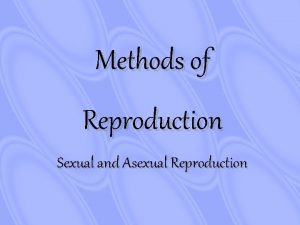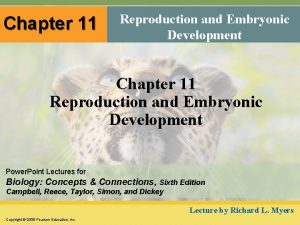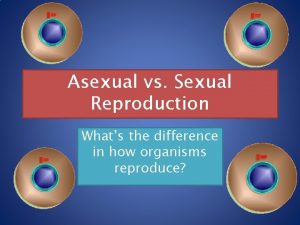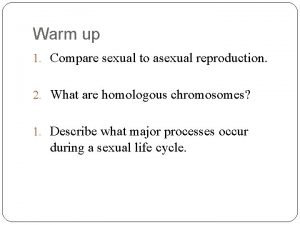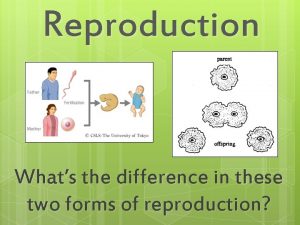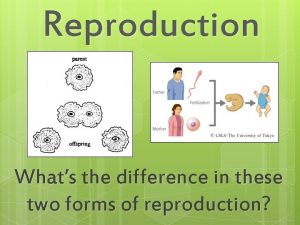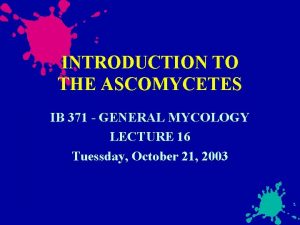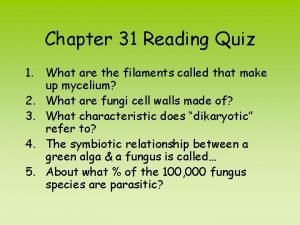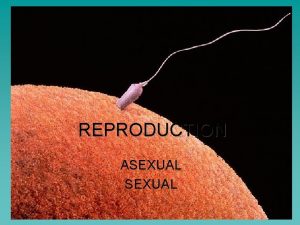Asexual Reproduction Asexual reproduction is a method of






















- Slides: 22

Asexual Reproduction Asexual reproduction is a method of reproduction with all the genetic information coming from one parent.

Asexual Reproduction • Asexual reproduction is the formation of new individuals from the cell(s) of a single parent. • HAPPENS BY MITOSIS ONLY • It is very common in plants; less so in nimals

• Did I tell you asexual reproduction only involves MITOSIS? ? ?

Asexual reproduction is sometimes called cloning. Cloning is the production of identical genetic copies. All forms of asexual reproduction are variations of the cell division process of mitosis. Mitosis is associated with asexual reproduction, as well as growth and repair in sexually reproducing organisms. Mitosis

Types/Methods of Asexual Reproduction • 1. binary fission -- involves an equal division of both the organism cytoplasm and nucleus to form two identical organisms -- the diagram of the protist at the right is example of this • Bacteria

Budding • Here, offspring develop as a growth on the body of the parent. -- the diagram of a yeast at the right is an example of this

Sporulation • sporulation (spore formation) -- is reproduction involving specialized single cells coming from one parent – • Ex. , mold spores

Bread Mold

Sporulation

Vegetative propagation in Plants • A plant body part/organ can be used for to make the whole plant. • Like a stem

Stems • In some species, stems arch over and take root at their tips, forming new plants. • The horizontal aboveground stems (called stolons) of the strawberry (shown here) produce new daughter plants at alternate nodes.

• Other part is: • Leaves •

Leaves • This photo shows the leaves of the common ornamental plant Bryophyllum (also called Kalanchoë). Mitosis at meristems along the leaf margins produce tiny plantlets that fall off and can take up an independent existence.

Roots • Some plants use their roots for asexual reproduction. • The dandelion is a common example. Trees, such as the poplar or aspen, send up new stems from their roots. • In time, an entire grove of trees may form — all part of a clone of the original tree

CLONE


REGENERATION • Where you can grow a body part or a whole new organism




List methods of Asexual reproduction

Why is it that while star fish can regenerate its arms, but human can not?
 Sexual reproduction vs asexual reproduction venn diagram
Sexual reproduction vs asexual reproduction venn diagram Asexualk
Asexualk Asexual and sexual reproduction venn diagram
Asexual and sexual reproduction venn diagram Vegetative propagation
Vegetative propagation Fission vs budding
Fission vs budding Roundworms nervous system
Roundworms nervous system Budding asexual reproduction
Budding asexual reproduction Example of asexual reproduction
Example of asexual reproduction Asexual propagation layering
Asexual propagation layering Type of sexual reproduction
Type of sexual reproduction Asexual reproduction
Asexual reproduction Gastrula
Gastrula Sexual and asexual reproduction
Sexual and asexual reproduction Whats asexual reproduction
Whats asexual reproduction Examples of reproduction
Examples of reproduction Chapter 19 asexual reproduction
Chapter 19 asexual reproduction Difference of sexual and asexual reproduction
Difference of sexual and asexual reproduction Whats reproduction
Whats reproduction Whats reproduction
Whats reproduction Sexual reproduction
Sexual reproduction Ascomycota asexual reproduction
Ascomycota asexual reproduction Chromosome number of animals
Chromosome number of animals Ascomycota asexual reproduction
Ascomycota asexual reproduction
